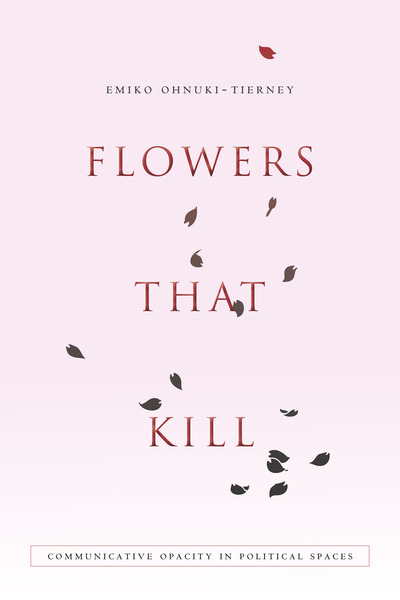
2015
296 pages.
from $32.00
Paperback now $16.00 (50% off)
Hardcover ISBN: 9780804794107
Paperback ISBN: 9780804795890
Ebook ISBN: 9780804795944
Flowers are beautiful. People often communicate their love, sorrow, and other feelings to each other by offering flowers, like roses. Flowers can also be symbols of collective identity, as cherry blossoms are for the Japanese. But, are they also deceptive? Do people become aware when their meaning changes, perhaps as flowers are deployed by the state and dictators? Did people recognize that the roses they offered to Stalin and Hitler became a propaganda tool? Or were they like the Japanese, who, including the soldiers, did not realize when the state told them to fall like cherry blossoms, it meant their deaths?
Flowers That Kill proposes an entirely new theoretical understanding of the role of quotidian symbols and their political significance to understand how they lead people, if indirectly, to wars, violence, and even self-exclusion and self-destruction precisely because symbolic communication is full of ambiguity and opacity. Using a broad comparative approach, Emiko Ohnuki-Tierney illustrates how the aesthetic and multiple meanings of symbols, and at times symbols without images become possible sources for creating opacity which prevents people from recognizing the shifting meaning of the symbols.
About the author
Emiko Ohnuki-Tierney is the William F. Vilas Professor of Anthropology at the University of Wisconsin. She is the author of numerous books, including Illness and Culture in Contemporary Japan (7th printing in 1997) and Rice as Self: Japanese Identities Through Time (3rd printing in 1995), the editor of Culture Through Time (Stanford, 1991), and contributor to Golden Arches East (Stanford, 2006).
"Contrasting the symbolism of cherry blossoms manipulated by the Japanese military state and that of the rose in Europe, Ohnuki-Tierney explores how authoritarian regimes use icons of popular culture to foster their domination. This superb book opens a new chapter in political anthropology, showing how the use of symbols in political discourse both produces meaning and disguises the foundations upon which this meaning is constructed."
—Philippe Descola, Collège de France
"Flowers That Kill is an impressive, wide-ranging feat of scholarship that illuminates a fascinating topic: the capacity of flowers to shift imperceptibly from benevolent symbols to harbingers of death and destruction. The deft but nuanced way in which Ohnuki-Tierney handles this sensitive material makes the book of crucial importance to academics and non-academics alike—really, to anyone still troubled by the horrors of World War II or by the human calamities of our times."
—Peter Geschiere, University of Amsterdam, author of Perils of Belonging
"Flowers That Kill is a monumental work of political philosophy. Powerfully argued and dazzlingly precise, Ohnuki-Tierney's nuanced portrait of the linguistic, cultural, and historical underpinnings of political symbols across Japan and totalitarian Europe is essential reading for anyone interested in how propaganda actually works."
—Sharalyn Orbaugh, University of British Columbia
"...As debate continues over the meaning of the Japanese Constitution or the Confederate battle flag in America, this study adds valuable insights into the workings of symbolism and identity."
—Nicolas Gattig, The Japan Times
"Flowers That Kill is a timely reminder of the limits of resistance and the power of symbols in a time where entrenched ideologies continue to propel political conflicts from all sides."
—Jason Danely, American Ethnologist
"Flowers That Kill is an important and daring new contribution to political anthropology. Emiko Ohnuki-Tierney investigates the use of owers, and other living things, in the schemes to bolster and enforce certain forms of political power, especially authoritarian politics.This is an audacious intervention into the political anthropology of propaganda and of the political gods and god father politicians that devise and deploy it. The book is certain to provoke much thought and debate."
—Magnus Fiskesjö, American Anthropologist